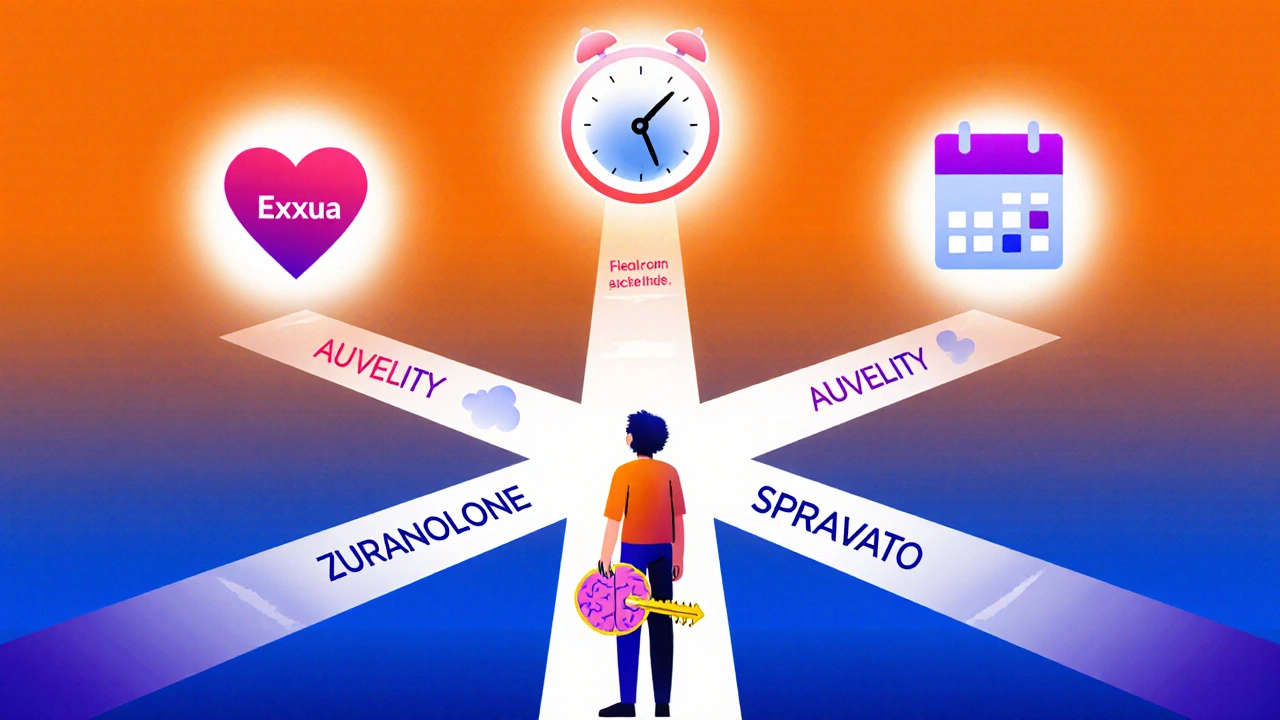New antidepressants like Exxua, Zuranolone, and SPRAVATO offer faster relief and fewer side effects than traditional SSRIs. Learn how they work, who they help most, and what to expect in 2025.
Depression treatment: what really helps and how to begin
Most people expect a pill to fix everything. Reality is different: effective depression treatment usually mixes several tools — medication, therapy, and everyday habits. If you feel stuck, this guide gives clear, practical steps you can try now and what to expect in the first weeks.
Quick treatment options
Medication: Antidepressants can reduce symptoms. Common choices are SSRIs (sertraline, escitalopram), SNRIs (venlafaxine, duloxetine), bupropion (Wellbutrin) and mirtazapine. Each works a bit differently. SSRIs are often first-line for anxiety and low mood. Bupropion helps energy and motivation, while mirtazapine can help sleep and appetite. Expect 4–6 weeks to notice real change; dose adjustments or switching drugs are normal.
Therapy: Cognitive Behavioral Therapy (CBT) and interpersonal therapy are proven to work. CBT teaches practical skills to change unhelpful thoughts and small behaviors that lift mood. Many people do best with both meds and therapy — medicine eases symptoms while therapy teaches tools to prevent relapse.
Other medical options: If meds and therapy don’t help, there are other options like transcranial magnetic stimulation (TMS) and, for severe cases, electroconvulsive therapy (ECT). Your psychiatrist will explain the pros and cons.
Practical tips & safety
Start small with daily habits. Aim for regular sleep, a short walk, and one social contact each day. Exercise boosts mood quickly—30 minutes, three times a week shows benefits for many people. Cut back on alcohol and drugs; they can make depression worse and interfere with medications.
Supplements: Some people try omega-3, vitamin D, or SAMe. Evidence varies. Tell your doctor about any supplement — some interact with meds or affect lab tests.
Side effects and expectations: Most antidepressants cause side effects early on—nausea, sleep changes, or mild agitation. These often fade in a couple of weeks. Don’t stop suddenly; work with your prescriber to taper if needed. If you feel worse, especially suicidal thoughts, contact a clinician or emergency services immediately.
Choosing a doctor or therapist: Look for someone who listens, explains options, and sets clear follow-ups. If you don’t click with a therapist or your meds aren’t working after a fair trial, it’s okay to get a second opinion.
Practical checklist: 1) Get a medical assessment to rule out medical causes (thyroid, vitamin deficiency). 2) Try a structured treatment plan—meds, therapy, or both. 3) Track symptoms weekly to see progress. 4) Keep emergency contacts and a safety plan if thoughts of self-harm appear.
Depression can feel like a heavy fog, but many people recover or learn to manage it well. With the right combination of treatment and small daily steps, you can get clearer, more consistent relief. If you’re unsure where to start, contact a primary care doctor or mental health professional for a straightforward plan tailored to you.
Navigating the world of antidepressants can be daunting, especially if Wellbutrin SR isn't quite the fit you expected. This article delves into five notable alternatives available in 2025 that offer varied approaches to treating major depressive disorder. From Remeron's unique mechanism to the combined efforts of Lexapro and Wellbutrin SR, the options listed here cater to diverse needs and chemical responses. Understanding these alternatives empowers individuals to make informed decisions on their mental health journey. Get to know the pros and cons of these medications to find what might work best for you.


